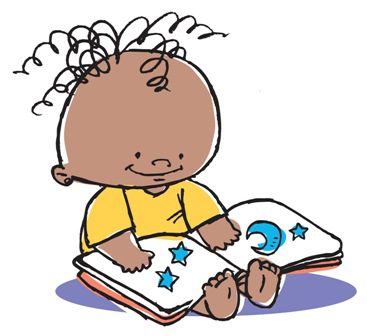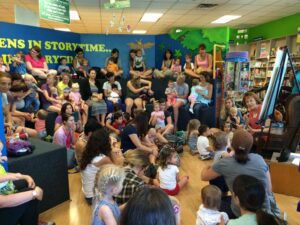
Unlocking Communication and Early Literacy: Baby Signs® Classes at Your Local Library

Parenthood is an incredible journey filled with precious moments and milestones. One of the most eagerly awaited milestones for parents is when their baby starts communicating. While verbal communication typically takes time to develop, there’s a fascinating method that can bridge the communication gap between parents and their little ones – Baby Signs®. And guess where you can find these wonderful Baby Signs® classes? Your local library!
In recent years, libraries have evolved into more than just book repositories; they’ve become community hubs, offering a wide range of educational and enrichment programs. Baby Signs® classes are one such program that has gained immense popularity among parents and caregivers. In this blog post, we’ll explore what Baby Signs® is, why it’s beneficial for babies and parents, and how libraries are playing a pivotal role in bringing this incredible program to families while promoting early literacy.
What is the Baby Signs® Program?
The Baby Signs® Program teaches infants and toddlers to use simple, age-appropriate sign language and gestures to communicate their needs, wants, and feelings before they can speak. This innovative approach was developed by Dr. Linda Acredolo and Dr. Susan Goodwyn, who conducted extensive research on the subject.
The idea behind Baby Signs® is simple: Babies naturally use gestures to communicate, such as pointing or waving bye-bye. By introducing additional signs, parents can help their babies express themselves more effectively, reducing frustration and enhancing the parent-child bond.

Benefits of Baby Signs® for Early Literacy:
Enhanced Communication: Baby Signs® empower infants to express their needs and feelings, reducing frustration and tantrums. This early communication helps parents better understand their baby’s wants and needs, laying the foundation for effective communication and comprehension skills later in life.
Accelerated Language Development: Studies have shown that children who use sign language as infants tend to speak earlier and have larger vocabularies than their peers who do not. This early exposure to language is a fundamental aspect of early literacy.
Stronger Bond: The act of teaching and learning signs together fosters a stronger emotional connection between parents and their babies. This bond is crucial in creating a positive environment for early literacy development.
Boosted Confidence: Babies who can communicate their needs more effectively tend to be more confident and less prone to frustration. Confidence is a key element in a child’s willingness to explore books and reading, which are fundamental to early literacy.
The Baby Signs® Program at Libraries: Promoting Early Literacy

Libraries are increasingly recognizing the value of Baby Signs® classes as part of their early childhood programming. Here’s how libraries are contributing to this wonderful initiative while promoting early literacy:
Accessible Resources: Libraries offer a wealth of resources, including books and videos related to infant sign language. Parents can borrow these materials to reinforce what they learn in classes, fostering a love for books and reading from an early age.
Free or Low-Cost Classes: Many libraries offer Baby Signs® classes or story times for free or at a nominal cost, making them accessible to a wide range of families. These classes often incorporate books and storytelling, further promoting early literacy.
Community Building: Classes at libraries provide a sense of community for parents and caregivers. It’s a chance to connect with others who are experiencing the same joys and challenges of parenthood, creating a supportive network for early literacy discussions and resources.
Professional Instructors: Libraries often partner with experienced Baby Signs® instructors who guide parents and babies through the learning process, emphasizing the importance of language development and early literacy.
Parenting Support: These classes often include parenting tips and guidance, creating a comprehensive support system for families. These resources often include recommendations for age-appropriate books and activities that promote early literacy.
Baby Signs® classes and programs at your local library are more than just a fun activity for babies and parents; they’re a powerful tool for enhancing early communication, fostering a strong parent-child bond, and promoting early literacy. By offering these classes and related resources, libraries play a vital role in preparing young children for a lifetime of learning through language and literacy. If you’re a parent or caregiver of a young child, consider checking out Baby Signs® classes at your local library. It could be the key to unlocking not only effective communication with your little one but also a lifelong love of reading and learning.
If you are interested in enrolling your baby in a Baby Signs® class, check with your local library or contact a certified instructor near you. These classes are a great way to help your baby learn to communicate and build their early language skills.
Here are just a few libraries that offer Baby Signs® Classes, Workshops and/or Story Times
- Airdrie Public Library Airdrie, AB Canada
- Auburn Public Library Auburn, AL
- Harrison Township Public Library, Harrison, MI
- Jackson County Library Services Medford, OR
- Phoenix Central Library, Phoenix, AZ
- Saratoga Springs Public Library Saratoga Springs, NY
- Warren Arthur Miller Library Warren, MI
- Wells Branch Community Library Austin, TX
- West Bloomfield Township Library West Bloomfield, MI
- Westport Library Westport, CT
- Whitecourt & District Public Library, Whitecourt, Alberta Canada
